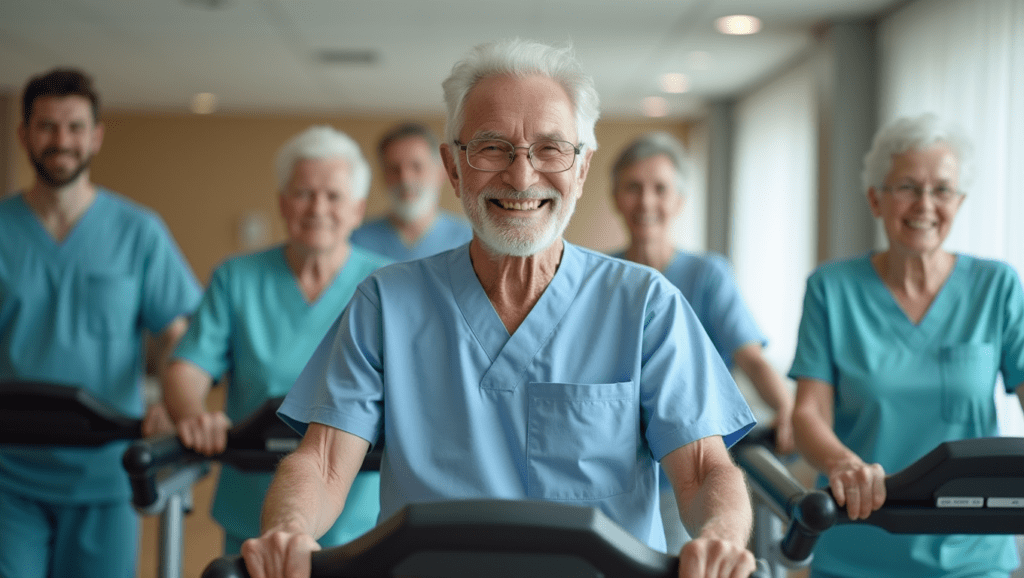As we age, recovering from significant health events like heart attacks, hip and knee replacements, or hip fractures becomes more complex. Rehabilitation for seniors is critical to restoring mobility, independence, and overall quality of life. Traditionally, this process involved physical therapy, regular doctor visits, and family support. However, Artificial Intelligence (AI) is now emerging as a powerful tool to enhance rehabilitation, providing personalized care, improved outcomes, and more efficient recovery.
1. Rehabilitation After a Heart Attack
After a heart attack, the journey to recovery can be both physical and emotional. Seniors often require cardiac rehabilitation programs that include exercise, diet management, and mental health support. AI-powered technologies, such as wearable devices and mobile apps, are revolutionizing cardiac rehabilitation.
- AI in Cardiac Monitoring: AI-powered wearable devices can continuously monitor heart rate, blood pressure, and other vital signs. These devices alert both patients and healthcare providers if abnormal readings are detected, allowing for timely intervention and adjustments to the rehabilitation plan.
- Personalized Exercise Programs: AI-driven algorithms can design personalized exercise regimens that adapt based on real-time feedback from the patient’s performance, ensuring that they progress at a safe, optimal pace.
- Virtual Coaching and Support: AI chatbots and virtual assistants provide seniors with 24/7 support, answering questions, offering motivation, and guiding them through daily activities, contributing to emotional well-being during the recovery period.
2. Recovery Following Hip and Knee Replacements
Hip and knee replacements are common procedures for seniors, helping to restore mobility and alleviate pain. However, the rehabilitation process can be long and challenging. AI is playing an important role in accelerating recovery and improving outcomes.
- Robotic-Assisted Surgery: AI-powered robotic surgery systems are increasingly being used in joint replacements. These systems allow for more precise surgical interventions, which can lead to faster recovery times and improved joint function.
- AI-Guided Physical Therapy: Traditional physical therapy is essential for regaining mobility, but AI can enhance this process. AI-powered rehabilitation platforms, equipped with motion sensors, can track a patient’s movement and provide real-time feedback on exercises. This helps seniors perform their rehabilitation exercises correctly at home, reducing the need for frequent clinic visits.
- Predictive Analytics for Recovery: AI algorithms can analyze a patient’s medical history and post-surgery progress to predict recovery timelines. This allows healthcare providers to adjust rehabilitation plans proactively, ensuring better outcomes for seniors.
3. Rehabilitation After Hip Fracture Surgery
Hip fractures are serious injuries, especially for seniors, often leading to long periods of immobility and a decline in overall health. Early and effective rehabilitation is crucial to prevent complications and regain independence.
- AI-Enhanced Fall Detection and Prevention: Falls are a leading cause of hip fractures. AI-based systems, such as smart home devices or wearable sensors, can predict and detect falls by monitoring gait patterns and balance. These systems can alert caregivers and family members in real-time, enabling faster response and preventing further injuries.
- Virtual Physical Therapy: AI platforms can deliver virtual rehabilitation programs for seniors recovering from hip fractures. With real-time motion analysis and corrective feedback, patients can perform exercises at home, reducing the strain of traveling to physical therapy centers.
- AI in Mobility Aids: Advanced AI-powered devices like exoskeletons or smart walkers are being developed to assist seniors in walking more confidently and safely during the recovery period.
4. AI in Other Health Events: Stroke, COPD, and Dementia
Other health events, such as strokes, chronic obstructive pulmonary disease (COPD), and dementia, require specialized rehabilitation programs. AI is expanding its role in these areas as well.
- Stroke Rehabilitation: AI-powered neurorehabilitation systems use brain-computer interfaces to help stroke patients regain motor function. These systems stimulate the brain to form new neural connections, improving the patient’s ability to move and regain independence.
- AI in COPD Management: AI-driven inhalers and monitoring devices help COPD patients manage their symptoms better. AI analyzes breathing patterns and medication usage, offering personalized suggestions to improve lung function and reduce hospital readmissions.
- Cognitive Rehabilitation for Dementia: AI tools, including brain games and virtual reality (VR) therapies, are helping seniors with dementia maintain cognitive function and memory retention. These tools personalize activities based on the patient’s cognitive level, providing a stimulating environment that encourages brain health.
5. The Future of AI in Senior Rehabilitation
AI’s role in senior rehabilitation is still evolving, but the potential is enormous. From improving patient outcomes to enhancing the efficiency of rehabilitation programs, AI is reshaping the way we approach senior care. Here are some key advancements we can expect in the near future:
- AI-Powered Telehealth: As telemedicine becomes more prevalent, AI will integrate into virtual consultations, allowing doctors to remotely monitor recovery progress and adjust treatments accordingly. This reduces the burden of frequent hospital visits for seniors.
- AI-Personalized Nutrition Plans: Nutrition plays a vital role in recovery, especially after surgeries. AI systems can analyze a patient’s dietary needs, medical history, and recovery progress to develop personalized meal plans that accelerate healing.
- AI for Mental Health Support: Recovering from major health events often takes a toll on mental health. AI-driven mental health platforms can provide seniors with counseling, cognitive behavioral therapy (CBT), and mindfulness exercises to improve emotional well-being during rehabilitation.
Conclusion
Rehabilitation for seniors following major health events, such as heart attacks, hip and knee replacements, and hip fractures, is essential to restoring their quality of life. With the integration of AI technologies, the rehabilitation process is becoming more personalized, efficient, and effective. From AI-powered wearables and virtual coaching to predictive analytics and robotic-assisted surgeries, AI is transforming the future of senior care.
As AI continues to evolve, seniors will benefit from more tailored rehabilitation programs that not only promote physical recovery but also enhance their overall well-being. It’s an exciting time for both healthcare professionals and patients, as AI opens new possibilities in the field of senior rehabilitation.
If you’re interested in learning more about how AI can improve senior health and rehabilitation, visit CoolSenior.org to explore the latest innovations and tools designed specifically for seniors.


